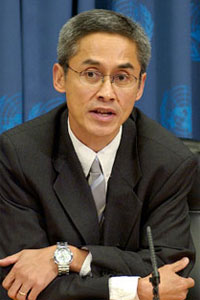
Does Thailand need a law to regulate the operations of non-governmental organisations (NGOs), otherwise known as non-profit organisations (NPOs)? A draft law has emerged recently which is causing a lot of headaches for civil society. The cabinet on Tuesday approved this draft in principle; it is now being forwarded to the Ministry of Social Development and Human Security for a public hearing, before it is sent to parliament for final approval. The authorities claim the new law is required to make the work of NGOs more transparent and to counter money-laundering.
The preferred starting point for tackling this issue is to admit that the country already has too many laws that can regulate NGOs. The Civil Code has provisions on the registration of foundations and associations, enabling the supervision of many NGOs. The various national security related laws such as provisions of the Criminal Code on lese majeste and sedition, as well as the anti-money laundering law, the Computer Crime Act and the emergency decree, give the authorities broad powers of surveillance over the operations of NGOs. The law on public assembly also regulates the work of NGOs if their members take to the streets to congregate.
Internationally, the country is regarded as having far too many restrictions on political rights, particularly on freedom of expression and assembly. Evidently, there is no lack of legislation but rather over-legislation that is constraining civic space.
For the sake of perspective, it is useful to regard NGOs as the embodiment of freedom of association, where a group of people gather for a common purpose. This is a basic human right, although the right is not absolute and can be restricted if certain conditions are fulfilled. In this respect, Thailand is a party to the 1966 International Covenant on Civil and Political Rights, which opens the door to restrictions based on national security, public order, public health and public morality. However, to invoke those restrictions, the state must prove that it is not arbitrary, and must be justified, necessary and proportionate to the circumstances.
As for the issue of foreign funding which the authorities fear might lead to opacity of NGOs' work, it should be remembered that the country was part of the global consensus which adopted the United Nation's Declaration on human rights defenders in 1998 which called for states to respect the right of these defenders, including NGOs, to access resources. This implicitly includes foreign funding.
The current version of the draft NGO law goes against those international standards. The anomalies include both the form and substance of the law. First of all, there has not been adequate consultation with civil society during the drafting process. Section 77 of the current constitution says clearly that there should only be a law if it is necessary, and that if a new law is to be proposed, there should be public hearings to listen to those affected by it. The drafting process has not abided by this provision.
Parts of the draft law give the misleading impression that it is to help promote NGOs' work. Under the draft, a national committee is to be set up nationally to "promote and develop" NGOs.
However, if the substance of the draft law is scrutinised, it essentially aims to regulate, supervise and control rather than to support the work of these organisations.
Part two of the draft law is particularly problematic. Section 19 obliges NGOs to report their operations to the authorities, and the authorities have broad discretion to order them to stop their operations.
Section 20 has vague provisions to prohibit the work of an NGO where it affects national security, economic security or international relations; where it causes "social disruption"; and where it impacts the well-being of other people. These exceed the various international conditions listed earlier, such as the principle of proportionality. They also go beyond what is permissible under the constitution, of which Section 42 on freedom of association does not mention the possibility of limits being imposed in regard to "social disruption" or in relation to the well-being of others.
Section 22 then obliges NGOs to reveal the sources of their funding, including foreign donations, and their accounts must be available for checking by the authorities for up to three years. This is then followed by sections 25 to 27, which impose sanctions for any violations. These include a fine of 50,000 baht for failure to report operations to the authorities, with a further fine of 1,000 baht for delayed compliance. Regarding activities that contravene national security and the other grounds mentioned, a fine of 500,000 baht can be imposed on the erring NGO, with a further fine of 10,000 baht for delayed compliance.
There is "double dosage" in regard to the sanctions mentioned. Not only is the NGO liable for those exorbitant fines, but also the manager of the NGO is under separate liability and can be fined to the same extent.
The law is hastily emerging from the executive branch, but parliamentarians should be more aware of its negative implications. It will also affect the operations of foreign groups in Thailand classified as NPOs, begging certain questions. Will trade associations such as foreign chambers of commerce, and clubs linked with embassies, fall under its provisions? Foreign funding, whether from nearby countries or those further afield, will not escape the web of this law, thus complicating international relations.
As a postscript, international guidance dictates that if there is to be a law on the matter, it should be a law which enables NGOs to notify the authorities so they can benefit from tax incentives and other support rather than an intrusive instrument which reduces the civic and democratic space in the country.
